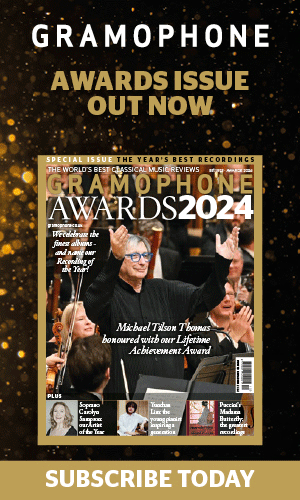Gramophone Concerto Award 2022
Bartók. Beethoven. Berg Violin Concertos
Frank-Peter Zimmermann vn BPO / Alan Gilbert, Daniel Harding, Kirill Petrenko
Berliner Philharmoniker
Handsome isn’t the word. A blue and gold gatefold oblong package, one half casing two CDs and a Blu ray disc (including an interview with Zimmermann), the other, 80 pages, with texts in German and English as well as copious illustrations, all relating to the artists, the music they’re playing and the orchestra’s personnel. The only feasible complaint would be a lack of shelf space for such a sizeable production, but most takers – and hopefully there will be many – won’t complain. In any case the music and the way it’s played are the principal priorities.
First, the Beethoven Concerto, a whole new world according to Frank Peter Zimmermann in 2019. His recording with the English Chamber Orchestra from 1987 trod a soberly traditional path, the first movement there stretching to 25'18" (as compared with 21'41" on this new version; both use Kreisler’s cadenzas, by the way), the Larghetto nowadays wistfully expressive, the dancing finale (9'14" rather than 10'53") admitting an added cadential flourish at 1'59". It’s a wholly joyous affair, though still rigorously argued, the Berliners’ playing under Daniel Harding alert to the score’s every phrase.
‘The first movement is tonally silken and shaped by Petrenko with the hypnotic skill of a Celibidache’
Contrasts in tempo are far less acute when it comes to comparing Berg’s Concerto in Zimmermann’s earlier recording with the Stuttgart Radio Symphony Orchestra under Gianluigi Gelmetti (a conductor I generally admire) with this 2020 Berlin version under Kirill Petrenko, where Berg’s tribute ‘to the memory of an angel’ becomes a tribute to the memory of a ‘dancing angel’. To take just one point of comparison, in the first movement from 4'30" under Gelmetti as opposed to the same passage (from around 4'28") with Petrenko you’re made freshly aware of the Viennese aspect (the ‘angel’ Manon Gropius was born in Vienna at the height of the First World War) and the way the concerto falls into two distinct emotional halves, fantastical recollection in the first, heartbreaking reflection in the second. Zimmermann, Petrenko and the BPO are painstakingly attentive in the way they release the full tonal range of Berg’s variegated canvas, in the second movement initially a threatening tower block, then kneeling, by stages, to the Bach reference and a world of prayer. Rarely have I heard a performance that combines musical refinement with a sense of tragedy in the way that this one does. Given sound that is remarkably well balanced and impactful (you can also enjoy these performances on high-definition video, provided you have a Blu ray player), this surely has to be the version of the Berg you go to first, with the Beethoven warranting a recommendation that’s virtually as strong. So thank you to producer Christoph Fanke and his expert team.
The two Bartók concertos were recorded in 2016, the Second being remarkably urgent (in the first movement, timings-wise, Zimmermann pips both Tetzlaff and Zehetmair – the latter admittedly by a mere whisker – to the finishing line). Just as Zimmermann brought an element of the dance to the first movement of the Berg, in Bartók’s Second he and Alan Gilbert release an unforetold sense of play. It’s as if suddenly the music has found the confidence to ‘let go’, follow its instincts, take on a sportive aspect. Two (very) minor reservations concern the work’s opening, which lacks an element of rustic bite (try Stern under Bernstein on Sony for comparison) and the first page or so of the second movement, which although warmly phrased on its own terms wants for tenderness (compare Menuhin with Dorati conducting, on Mercury). But these are momentary shortcomings, easily overlooked, especially in the context of a performance that is so fine overall. In the case of the First Concerto I have no reservations at all: the first movement is tonally silken and shaped by Petrenko with the hypnotic skill of a Celibidache. I’ve never heard better, whereas the Second darts and dances on the wings of youthful love, much as it should, given the work’s amorous groundsprings. The tuttis have a rhythmic punch that’s focused to perfection by the highly dynamic recording. So a firm thumbs up from me, and I expect one in return if you decide to invest. You won’t regret it. Rob Cowan
Gramophone Awards 2022 – The Winners
Select an Award-winner below to read full reviews of each of the winning albums and expert insights from our writers.
Recording Categories
Opera & Recording of the Year
Korngold: Die tote Stadt (Sols; Bayerisches Staatsorchester / Kirill Petrenko)
Instrumental
Ysaÿe: Six Solo Violin Sonatas (James Ehnes)
Early Music
Josquin: ‘Baisiez Moy’ (Thélème / Jean-Christophe Groffe)
Orchestral
Mahler: Symphony No 7 (Bayerisches Staatsorchester / Kirill Petrenko)
Concerto
Piano
Beethoven: Diabelli Variations (Mitsuko Uchida)
Concept Album
Enargeia (Emily D'Angelo; Das Freie Orchester Berlin / Jarkko Riihimäki)
Contemporary
Chamber
’Round Midnight (Quatuor Ebène; Antoine Tamestit; Nicolas Altstaedt)
Choral
JS Bach: St Matthew Passion (Sols; Pygmalion / Raphaël Pichon)
Song
Rachmaninov: Songs – ‘Dissonance’ (Asmik Grigorian; Lukas Geniušas)
Voice & Ensemble
‘BariTenor’ (Michael Spyres; Strasbourg Philharmonic Orchestra / Marko Letonja)
Spatial Audio
Ravel: Orchestral Works (Sinfonia of London / John Wilson)
Special Awards
Label of the Year
Artist of the Year
Young Artist of the Year
Special Achievement
Mozart Momentum (Leif Ove Andsnes; Mahler Chamber Orchestra)
Lifetime Achievement
Orchestra of the Year

Gramophone Digital Club
- Digital Edition
- Digital Archive
- Reviews Database
- Full website access
From £8.75 / month
Subscribe
Gramophone Full Club
- Print Edition
- Digital Edition
- Digital Archive
- Reviews Database
- Full website access
From £11.00 / month
Subscribe
If you are a library, university or other organisation that would be interested in an institutional subscription to Gramophone please click here for further information.






